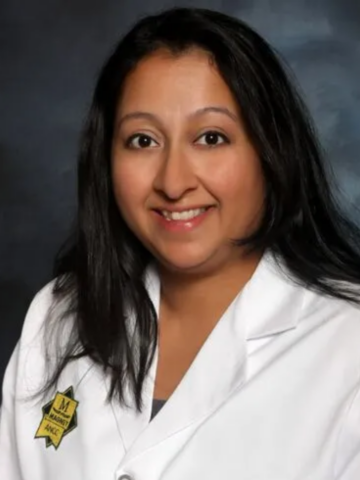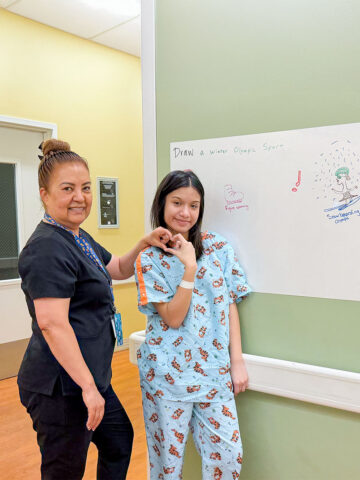Welcome to our newest series, Defender Profiles. You’ll learn about one of our amazing defenders of childhood – everything from what they do for CHOC to what they do for fun – and gain insight into a different department in our health system.
To kick off our series, we spoke with Lisa Murdock, a clinical travel nurse who made CHOC at Mission her home base eight years ago.
How long have you worked at CHOC?
I started as a travel nurse over a decade ago. At the time, I was living in Puerto Rico and had spent 12 years traveling coast to coast for nursing. Some of my favorite assignments were in Boston, San Francisco and Santa Barbara – anywhere I could surf. I came back to CHOC at Mission for multiple travel assignments – until one of the night shift nurses set me up on a blind date. We ended up getting married, and I signed on as staff eight years ago!

Why did you decide to go into nursing?
My first degree was in psychology and I worked at an inpatient psychiatric hospital in Boston. I was encouraged by nurses and the house supervisor to become a nurse, and during my clinical rotations at UMASS Amherst, I knew pediatrics was my calling. I love the honesty and resiliency of children; even when they’re sick, they still want to have fun, and despite being in the hospital and going through challenges, they have the most positive outlook.
Can you describe your current role?
Currently, I am a staff nurse at CHOC Mission – although recently, I have had multiple roles in anti-trafficking work at our facility. I’ve been working in anti-trafficking efforts in the community for the past eight years; I met a survivor in Orange County who did training in the community, non-profit sector and wondered why I wasn’t hearing more about this at work. So, at the time, I created a human trafficking response algorithm to start. After participating in the Evidence-Based Scholars Program, we have been able to create a human trafficking response for both the Orange and Mission campuses, and at Mission I created a human trafficking resource team that works to ensure there is a comprehensive response from admission to discharge. I also participated in the CHOC hackathon where I created an app with UCI students that connects identified survivors of human trafficking with resources upon discharge. Most recently, I completed a qualitative study on Orange County youth survivors’ perspectives on healthcare and human trafficking – what they have gone through and what their recommendations are for improving healthcare – and I’ll be presenting that at the Society of Pediatric Nurses Conference in April.
What do you love about being a nurse?
I have been a bedside pediatric nurse for 22 years and still love working directly with patients and their families, ensuring they get the best care we can provide. I will say, after working with survivors of human trafficking in the community from a nonprofit standpoint for the past eight years, I am excited about that work continuing within our organization. As a defender of childhood, identifying and responding to our most vulnerable patients is my priority.

How has your role changed due to the pandemic?
Since the pandemic, we have seen more mental health-related diagnoses, but I have been able to draw on past experience to provide care to this population. A lot of our patient population shifted with COVID, and we saw a significant increase in mental health patients. Because I have experience working at an inpatient psychiatric facility, I’ve felt equipped to handle this.
What do you love about working at CHOC?
The professional growth opportunities that CHOC offers, as well as mentoring from the research department and leadership, are life-changing. Jennifer Hayakawa, CHOC’s nurse scientist, has been instrumental in my professional growth and CHOC really provides a high level of programs for nursing development, such as the Evidence-Based Scholars Program.
How has CHOC changed and progressed in your time here?
In my time at CHOC, I have seen how practice changes based on current evidence and the needs of the community. The eating disorder program at CHOC at Mission is a good example of this. When I first arrived at CHOC at Mission as a travel nurse 13 years ago, there was no eating disorder program in place; in just the last three years have we adopted it in the hospital, and I’ve really seen it grow to meet the needs of the community. We have a large population with those needs, and now they can access a multidisciplinary team right here.
What do you wish people knew about CHOC at Mission?
Although we are a smaller facility within a larger hospital, the care patients will receive is excellent!
Do you have any favorite moments or stories about working at CHOC?
There are too many to mention! But my favorite part of working at CHOC at Mission is the relationship between nursing staff and our hospitalists. After working in multiple institutions around the nation, I can tell you that CHOC has the most collaborative hospitalists I have ever worked with.
What do you think makes someone a great defender of childhood?
A defender of childhood is someone who can work alongside their patients and families to understand their specific goals and provide the multidisciplinary care that is needed to achieve them, whether that be exemplary nursing and medical care, advocacy, education or outpatient support. A defender of childhood is someone who asks the right questions, develops a plan and follows through.

What are your hobbies and interests outside of work?
Although I no longer work as a travel nurse, I still have the travel bug. I travel frequently, surf, dive, hike and enjoy outdoor adventures. I currently live a stone’s throw away from the beach in South County with my husband and little 7-pound dog, Sweetie. I’m also very passionate about my anti-trafficking work and serve on county committees and work directly with survivors of human trafficking.




